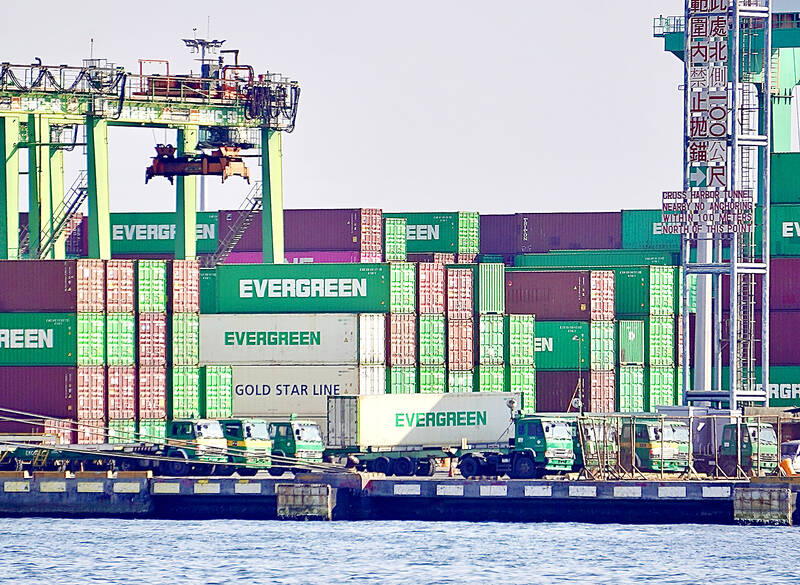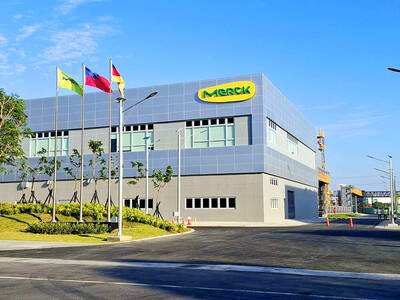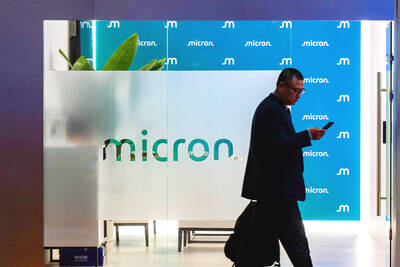The government’s business climate monitor last month flashed “yellow-red” light for the first time in two years, as strong industrial production, increasing imports of machinery equipment, robust domestic commercial activities and stock investments boosted the momentum of local businesses, the National Development Council said yesterday.
Prior to last month, the business climate monitor had maintained a “green” signal for three consecutive months.
The council measures the nation’s economic situation using a five-color system, with “blue” signaling a recession, “green” suggesting steady growth and “red” indicating a boom. “Yellow-red” reflects a slight boom, while “yellow-blue” shows sluggishness.

Photo: CNA
The total score of the monitor’s composite index rose four points from the previous month to 35, indicating steady growth for six months in a row, the council said in a report.
Meanwhile, the index of leading indicators, which gauges the economy’s direction in the next six months, moved up by 0.5 percent month-on-month to 102.09, rising for the seventh consecutive month, it said.
The index of coincident indicators, which tracks the current pace of economic activity, climbed 0.93 percent to 102.82, increasing for the 13th consecutive month, the council said.
“Benefiting from the growing demand for artificial intelligence and other tech applications, indicators such as industrial production, machinery and electrical equipment imports have turned to flashing red. Coupled with continued advancement in the leading and coincident indicators, the domestic economy is steadily recovering,” the council said.
Of the composite index’s nine components, the subindices on imports of capital equipment and sales of retail, wholesale and food and beverage services increased by two points each and changed from “green” the previous month to “red,” the report said.
The subindex on industrial production rose by one point, going from “yellow-red” a month earlier to “red,” while the subindex on manufacturing sales increased by one point, changing from “green” to “yellow-red, it said.
However, customs-cleared exports decreased by two points and flashed “green,” compared with “red” a month prior, the report said.
There were no changes in the signals of the other four subindices, including money supply, the TAIEX, non-agricultural employment and sentiment of the manufacturing sector, the report said.
Looking ahead, the council expects exports to continue showing steady growth, on the recovery of global trade and growing opportunities linked to emerging applications related to artificial intelligence.
It also said it expects domestic investment to continue gathering steam thanks to demand for advanced technologies, digital transformation and net zero carbon emissions, in addition to government projects for public works.
Meanwhile, private consumption is expected to retain strong momentum on the back of stable employment, higher minimum wages, a vibrant stock market and more government subsidies for housing and education, it said.
“However, uncertainties such as potential interest rate cuts in major economies, continued geopolitical risks and the intensifying rivalry between the US and China still exist, and their future developments deserve close observation,” the council said.

TECH TITANS: Amazon’s latest chip joins Google in competing for the 90 percent market share held by Nvidia, which claims it is ‘a generation ahead of the industry’ Amazon Web Services (AWS) on Tuesday launched its in-house-built Trainium3 artificial intelligence (AI) chip, marking a significant push to compete with Nvidia Corp in the lucrative market for AI computing power. The move intensifies competition in the AI chip market, where Nvidia dominates with an estimated 80 to 90 percent market share for products used in training large language models that power the likes of ChatGPT. Google last week caused tremors in the industry when it was reported that Facebook-parent Meta Platforms Inc would employ Google AI chips in data centers, signaling new competition for Nvidia. This followed the release last month of

INSULATED: The company said it is less exposed to global complications, as it has built a strong footprint worldwide, and has multiple sources of rare earths and raw minerals Merck Group yesterday said it would ramp up production next year at its new flagship facility in Kaohsiung’s Lujhu District (路竹) to satisfy growing demand for advanced semiconductor materials and specialty gases, and to address supply resilience issues amid mounting geopolitical risks. Merck made the remarks during a news conference before the inauguration of its 500 million euros (US$582.1 million) facility, which is also to supply other markets in the Asia-Pacific region, it said. Merck executive board deputy chair and electronics CEO Kai Beckmann told reporters the company adopted a “local-for-local” strategy about seven years ago to address the cycle time of

Two companies wholly owned by the daughter of the founder of Hon Hai Precision Industry Co (鴻海精密) on Monday reported to the Taiwan Stock Exchange that they would dispose of all of the Hon Hai shares they hold. In filings with the exchange, Hong Wei Investment Co (鋐維) said it would sell the 2.771 million Hon Hai shares it holds and Frontier Investment Corp (承鋒投資) said it would sell its 2.409 million Hon Hai shares from tomorrow until Jan. 3 next year. The two companies are wholly owned and chaired by Shirley Gou (郭曉玲), the eldest daughter of Hon Hai founder Terry

RIDING THE WAVE: The race to build AI infrastructure has lifted the valuations of top memory makers, such as Micron, amid dwindling inventories and supply challenges Micron Technology Inc is to spend ¥1.5 trillion (US$9.6 billion) to build a plant in western Japan to make memory chips for artificial intelligence (AI) applications, the Nikkei reported on Saturday. The move comes as Micron seeks to diversify advanced chip production outside of Taiwan, the Nikkei article said, citing people familiar with the matter. The new factory will manufacture high-bandwidth memory (HBM) chips, a key component for working with AI processors such as those made by Nvidia Corp, the report said. Micron would build the facility within the compound of its Hiroshima plant, starting in May next year, with plans to launch